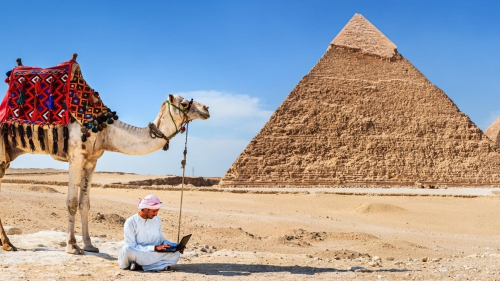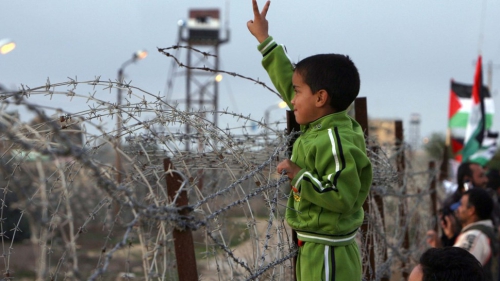Waiting for Jamilla
Over the holidays last year, the newspaper headlines told of half a million Jews from all over the globe descending on Jerusalem to celebrate Hanukkah. Whenever I see these reports, I can't help but wonder why Muslims don't make the same pilgrimage. And, inevitably, my thoughts turn to Jamilla.
I first met her when I was invited to work in a biochemistry lab at Iowa State University. Eager to fit in, I wondered whether the professors in Iowa be uncomfortable with my Islamic scarf? Will anyone in Iowa understand the veil?
I had no idea what to expect of life among "Iowans" or among professors and students who I suspected had little experience with Muslims. I was so worried about arriving in Iowa in Islamic dress that I conveyed my feelings to my sponsor.
She explained that my academic hostess would not be at all surprised by my headscarf. "There's an Arab woman, Jamilla, already working in the lab you'll be in. Her father, a Muslim, is Kuwaiti; her mother is an American Christian. Jamilla had a choice of religion and chose Islam. She wears the veil. She'll be your 'mentor' in America, a person to help you bridge your world with ours."
Mentor? I stopped worrying about my scarf - and started worrying about what a half-Kuwaiti woman would think of me. The official Palestinian policy had supported Iraq during the Gulf War. In addition, for many years Palestinian professionals had provided "cheap labor" for Kuwaitis and had never been accepted into the desert kingdom's society.
When the Gulf War ended, 300,000 Palestinians were forced to leave Kuwait because of the Palestinian leadership's decision to back Iraq. They and their families were perceived as traitors, people who had bitten the hand that fed them.
Would Jamilla hold these things against me? Would she see herself as superior to me?
We met the first day of lab at Iowa State. I approached Jamilla with professional reserve. She, on the other hand, gave me a huge smile and said, "How glad we are that you're here. Let me take you to lunch to celebrate your arrival." Relieved by her warmth, my fears began to disappear.
Here was a woman who spoke perfect American English and Kuwaiti-Arabic, as well! She seemed to fit in everywhere. Here was a woman so eager to make me feel comfortable that she brought me Middle Eastern food nearly every day of the week, made sure I understood those around me and stuck with me no matter what the situation.
It was impossible to refuse her gifts of sweets and Arabic coffee (which, in truth, I very much longed for). I was embarrassed by the gifts she brought me day after day. Jamilla wasn't above testing and teasing me now and then. But she was never unkind, never arrogant.
While Jamilla and I had common interests - science, psychology, philosophy - we were also very different. Unlike most Palestinians, she never bothered herself with politics. She took life much easier than I. She thought I needed a trip to Disneyland to see the happy side of life!
Jamilla came from a privileged Kuwaiti-American family and had a comfortable, secure life with the opportunity to do whatever she desired. I, on the other hand, came from a struggling family in an occupied land. I had left the Middle East only once before, and I did not have the freedom to pursue any interest that came into my head.
Americans couldn't see these differences. Because of our dress and background, and because we were both from the Middle East, they figured we must have similar cultures and ways. But Jamilla and I knew this was not so.
One day, our conversation turned to money. Jamilla asked, "Samah, what would you do if you suddenly received a million dollars?"
"A library," I said, "I'd establish a library. And you, Jamilla?"
"I'd travel. I'd explore the world."
"Would you visit Jerusalem?" I knew Jamilla had an American passport, so she would be able to come to my city. With only a Kuwaiti passport, entry would be much more difficult, if not impossible.
I went on, "You know, Jamilla, almost every Jew visits Jerusalem, and they come with the same kind of passion that Muslims display during one of our 'hajj' trips to Mecca. Why don't Arabs and Muslims come to Jerusalem, especially when they can? Do you think that Arabs who resist coming or who blame the inconveniences imposed by the Israelis are really thinking that Jerusalem does belong to the Jews, that it isn't worth the struggle to see what's for Muslims, as well as for Christians and Jews? I'd be so thrilled if you'd come and sit with me at the Dome of the Rock. You'd have no reason to be afraid. Ah, Jamilla, I want to return to you some of the favors you've shown me. How I hope you'll come!"
"God willing," Jamilla answered uncertainly, and our conversation ended abruptly.
A short time later, I left Iowa and returned to Jerusalem. A silence grew up between Jamilla and me. She was busy with her work, her family and her life in the United States. The hope of entertaining my friend - someone who had shown me a home away from home - in my own city vanished.
I glance again at the news headlines that made me think of Jamilla. They are bitter but perhaps not as sour as I think, as they did fill me with memories of a good friend I once had. "Will you come to Jerusalem, Jamilla?" I wonder. It's a question I will, no doubt, ask again and again.
_________________________________
Samah Jabr is a freelance writer and medical student in Jerusalem. This article was re-published with the author's permission. Palestine Report. You can visit their website at http://mail.jmcc.org/media/reportonline/report.html.

















